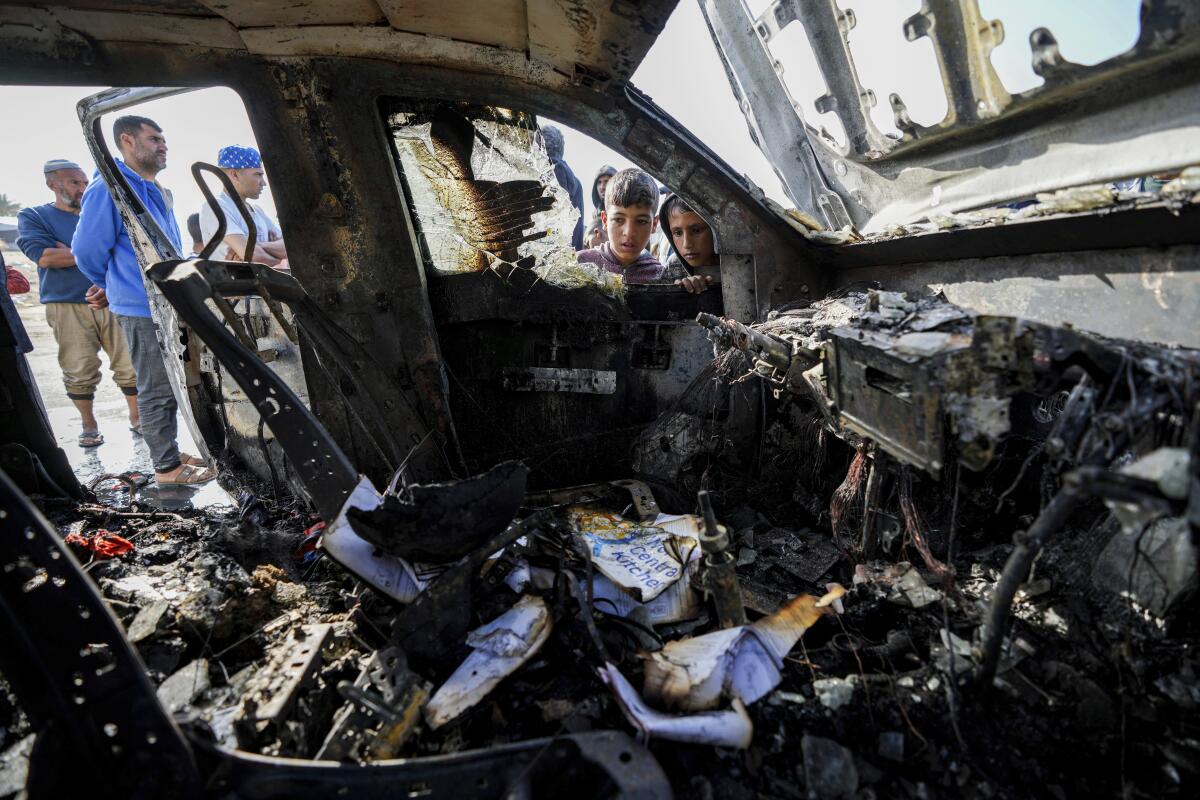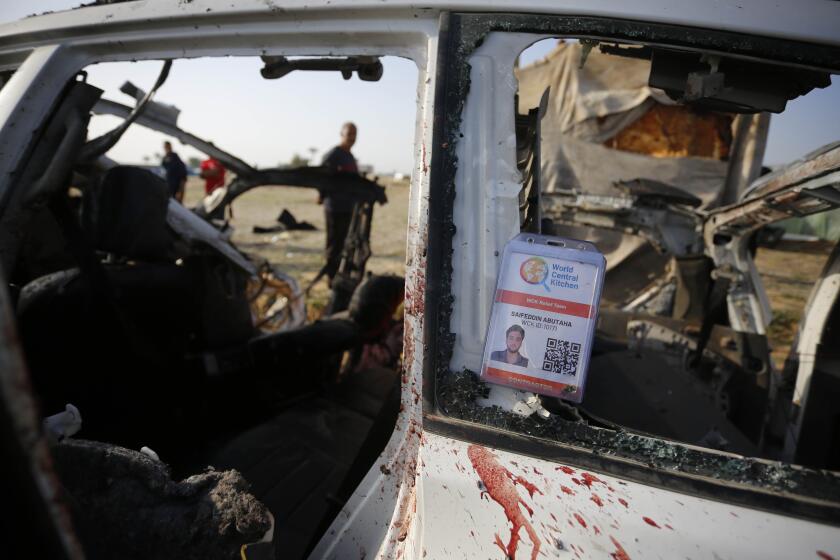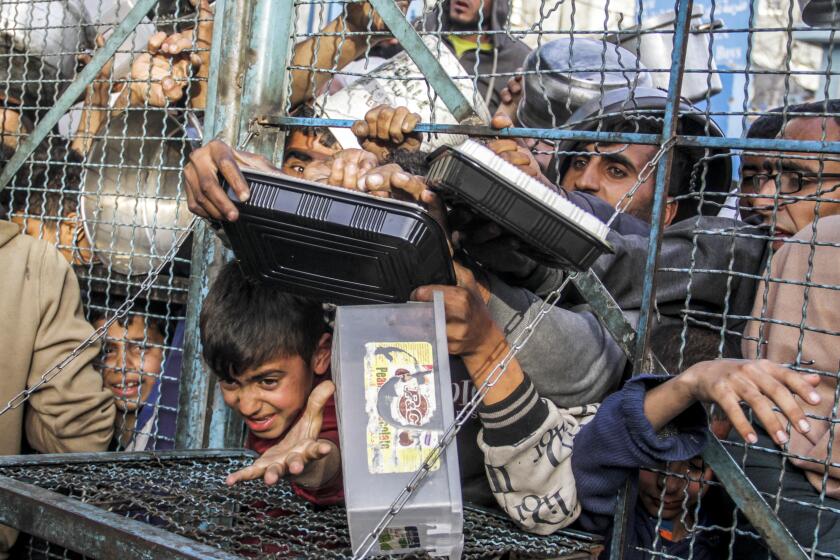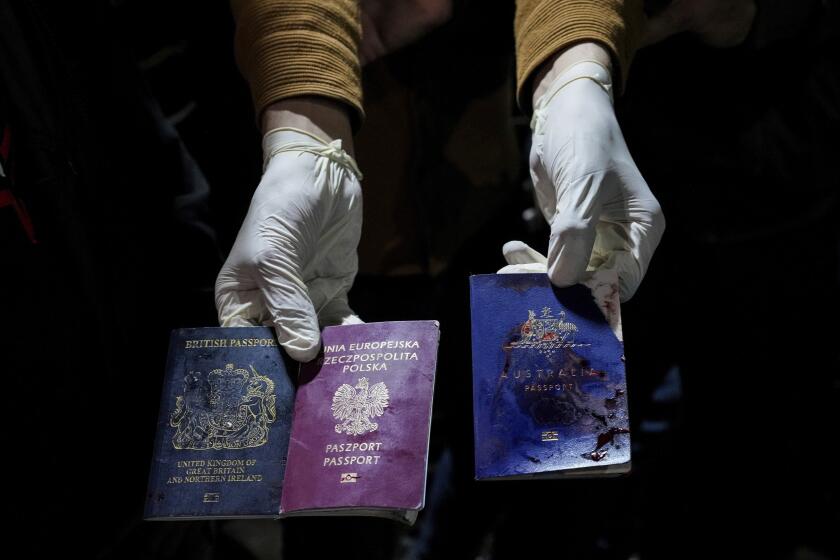Bodies of 6 foreign aid workers killed in Israeli strikes are transported out of Gaza

- Share via
RAFAH, Gaza Strip — The bodies of six foreign aid workers killed in Israeli airstrikes began the journey back to their home countries Wednesday as more questions swirled over Israel’s explanation that a “misidentification” led to the attack on their convoy.
The deadly strikes renewed criticism of Israel’s conduct in the nearly six-month-old war with Hamas and highlighted the risks that the military’s bombardment poses to aid workers as they try to deliver food to the besieged enclave. The U.N. says nearly a third of the Gaza population is on the brink of starvation.
The three British citizens, a Polish citizen, an Australian and a Canadian American dual citizen worked for World Central Kitchen, an international charity founded by celebrity chef José Andrés. Their Palestinian driver was also killed, and his remains were handed over to his family for burial in Gaza.
The other bodies were driven into Egypt through the Rafah crossing, according to the Palestinian Crossings Authority, which oversees border crossings.
The seven were distributing food that had been brought into Gaza through a newly established maritime corridor when Israeli airstrikes targeted their three vehicles late Monday, killing everyone inside.
Israel’s military chief, Lt. Gen. Herzi Halevi, announced the results of a preliminary investigation.
“It was a mistake that followed a misidentification — at night during a war in very complex conditions. It shouldn’t have happened.” He gave no further details. He said an independent body would complete a “thorough investigation” in the coming days.
Andrés said the strikes “were not just some unfortunate mistake in the fog of war.”
Staffers from World Central Kitchen, chef José Andrés’ humanitarian aid group trying to get food to Palestinians in Gaza, were killed in Israeli airstrikes.
“It was a direct attack on clearly marked vehicles whose movements were known by” the Israeli military, Andrés wrote in an op-ed published Wednesday by Israel’s Yediot Aharonot newspaper. “It was also the direct result of [the Israeli] government’s policy to squeeze humanitarian aid to desperate levels.”
World Central Kitchen said it had coordinated its movements with the military, and the vehicles were marked with the organization’s logo.
Andrés, a Spanish American chef whose organization has provided aid in war and disaster zones all over the world, including to Israelis after Hamas’ Oct. 7 attack that triggered the war, wrote that “the Israeli government needs to open land routes to food and medicine today. It needs to stop killing civilians and aid workers today.”
Spain’s prime minister, Pedro Sánchez, said Israel’s explanation so far was “absolutely unacceptable and insufficient” and called for “much more detailed clarification of what happened.” He spoke at a joint news conference in Doha with his Qatari counterpart. Qatar has played a key role in efforts to mediate a cease-fire, along with the U.S. and Egypt.
Some of Israel’s closest allies condemned the deaths, which led the World Central Kitchen and other charities to suspend food deliveries, citing the dire security situation.
Israeli officials have not elaborated on the nature of the mistake.
The military has repeatedly struck aid vehicles and ambulances, as well as humanitarian group offices and U.N. facilities, often justifying the attacks by saying suspected militants were present. The military says strikes are first cleared by legal experts, but critics have called the bombardment indiscriminate with little regard for civilian casualties.
More than 180 humanitarian workers have been killed in the conflict, according to the United Nations.
With warnings of ‘imminent’ famine in Gaza, there is a global push to get more aid to Palestinians amid the Israel-Hamas war. What are the roadblocks?
On Tuesday, Israeli TV reported initial findings that have not been officially confirmed, saying the army identified the cars carrying World Central Kitchen’s workers and observed suspected militants nearby. Half an hour later, the vehicles were struck by the air force. The reports said it was not clear who ordered the strikes or why.
Maya Sion-Tzidkiyahu, an expert in Israel-Europe relations at the Hebrew University of Jerusalem and the progressive think tank Mitvim Institute, said it was possible the military did not have enough control over commanders and soldiers on the ground, who are “taking some action into their own hands. They’re interpreting the engagement rules in a much more elaborate way.”
International reaction has been “extremely harsh, and it’s justified,” she said. “The credit that we had after Oct. 7 has already dwindled, and now it’s dwindled so much more.”
Israel faces growing isolation as international criticism of its Gaza assault has mounted. On the same day as the deadly airstrikes, Israel stirred more fears by apparently striking Iran’s Consulate in Syria’s capital, Damascus, killing two Iranian generals. The government also moved to shut down a foreign news outlet — Qatari-owned Al Jazeera television.
The hit on World Central Kitchen’s convoy threatened to set back efforts by the U.S. and other countries to open a maritime corridor for aid from Cyprus to help ease the desperate conditions in northern Gaza. Israel has severely restricted access to the north, where experts say famine is imminent.
U.S. President Biden and Israeli Prime Minister Benjamin Netanyahu are scheduled to speak Thursday amid growing White House frustration with Israel’s prosecution of the war and in the aftermath of Monday’s airstrikes, according to a U.S. official familiar with planning for the call. The official was not authorized to comment publicly and spoke on the condition of anonymity to discuss plans for the call.
In a statement Tuesday, Biden issued unusually blunt criticism of Israel, expressing outrage over the strikes and saying Israel “has not done enough to protect aid workers.”
World Central Kitchen staff killed in Israeli airstrikes in Gaza were British, Australian, Polish, American-Canadian and Gazan. They helped amid wars, earthquakes and wildfires.
Meanwhile, Monday’s strike on the Iranian Consulate in Damascus — which the U.S. assessed was carried out by Israel — hiked fears of a wider conflict. The strike killed 12 people.
Gen. Ramazan Sharif, a spokesman for Iran’s paramilitary Islamic Revolutionary Guard, said Wednesday that “soon we will see deadlier blows” against Israel by “the Resistance Front.”
He appeared to be referring to Iran and its allies across the region, including the Lebanese militant group Hezbollah and militias in Syria, Iraq and Yemen. They have repeatedly traded fire with Israel and the U.S. since the start of the war in Gaza.
The top U.S. Air Force commander for the Middle East, Lt. Gen. Alexus Grynkewich, said Wednesday that the U.S. is concerned that the Damascus strike could trigger new attacks on American troops by Iranian-backed militias in Iraq and Syria.
Nearly 33,000 Palestinians have been killed in Israel’s assault in Gaza, around two-thirds of them women and children, according to the territory’s Health Ministry, which does not distinguish between civilians and combatants in its count.
Hamas’ Oct. 7 attacks killed some 1,200 people and resulted in about 240 being taken hostage.
Hamas still holds an estimated 100 hostages and the remains of around 30 others, after most of the rest were freed last year in exchange for Palestinians imprisoned in Israel.
Associated Press writer Jahjouh reported from Rafah, Magdy from Cairo. AP writer Melanie Lidman in Jerusalem contributed to this report.
More to Read
Sign up for Essential California
The most important California stories and recommendations in your inbox every morning.
You may occasionally receive promotional content from the Los Angeles Times.













